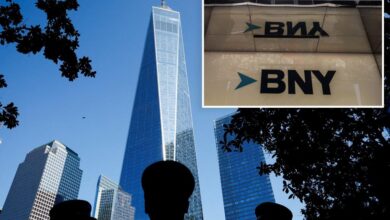Faith leaders could build homes under the YIGBY Act to end housing crisis

What if solving America’s housing crisis started in a church parking lot?
That’s the vision behind U.S. Sen. Mark Warner’s Yes in God’s Back Yard (YIGBY) Act, a newly proposed federal bill that would help faith-based and higher education institutions build housing on land they already own.
“Faith communities and universities are deeply embedded in our towns and cities,” Warner shared with Realtor.com® in a statement. “They often own underutilized land and facilities that could be repurposed for affordable housing.”
While many congregations want to step up and be part of the solution, Warner added that “outdated zoning rules” and local red tape often prevent them from doing so.
The YIGBY Act would help remove some of those roadblocks while providing grants and technical support to create homes for low-income renters, veterans, and families at risk of homelessness. And the need is urgent: The National Alliance to End Homelessness reports an 18% rise in homelessness in 2024, the largest jump in years, driven by worsening affordability.
Warner‘s bill builds on decades of local YIGBY momentum in places like California, where a similar law was passed in 2023. But with the U.S. now facing an estimated shortage of nearly 4 million homes, a federal YIGBY Act could be the key to unlocking new housing options in every state—especially in neighborhoods where land is scarce and prices are rising.
“I’ve heard from congregations and faith leaders in Virginia who want to use their land to help address the housing crisis,” Warner said. And now they may finally get the tools to do it.
Institutions that already support families—but can’t house them
For generations, faith-based organizations have been pillars in their communities, offering everything from food pantries to child care to health services. But amid the deepening housing crisis, many of these institutions are finding they have something else to offer: mission alignment, deep public trust, and land.
But not just any land. Faith-based organizations often own land in higher opportunity areas—or, in plainer terms, more expensive places.
Over half the developable land owned by these institutions in California is located in “high” and “highest” opportunity areas—neighborhoods that have the best economic, education, and health outcomes for residents—a 2023 report from UC Berkeley’s Terner Center for Housing Innovation found.
In San Francisco, 98% of the developable land was located near high-quality transit. In a city gripped by rising housing costs, these findings underline the latent potential in these parcels: If they weren’t owned by churches, they might already be developed into luxury lodgings.
But for all their desire to help, what faith-based institutions lack is the funding or technical capacity to turn their compassion into construction.
“These institutions already play a role in supporting families and students, and they’re trusted anchors in their communities,” explained Warner. “With the right federal support, they can help expand housing options in ways that strengthen neighborhoods and give more people a chance to afford a place to live.”
It’s a gap that Bart Cochran saw firsthand in Boise, ID—where faith communities wanted to build housing but lacked the tools to do it. As the founder of LEAP Housing and a longtime YIGBY advocate, Cochran now helps churches bridge that divide by securing financing, cutting through red tape, and even stepping in as the developer or lender when needed.
The results speak for themselves. LEAP’s foundational project turned a parking lot into two family-sized homes, with rents set at 50% below market rate—a truly affordable option for families in the area squeezed by rising prices.
A federal YIGBY law could offer similar resources at scale, empowering faith communities across the country to transform empty lots into affordable homes—and good intentions into real impact.
What the YIGBY Act would do
The key provision of the bill would provide federal grants and technical assistance for faith-based and higher education institutions that want to build or preserve affordable housing on land they already own. These funds could cover key costs like feasibility studies, site planning, permitting, and construction.
The legislation also includes $50 million per year in incentives for local governments to update restrictive zoning policies that often prevent projects from moving forward. In many communities, lot size minimums, use limitations, or public opposition can stop even well-intentioned, community-led housing proposals in their tracks. The bill would help jurisdictions modernize outdated rules and reduce red tape—making it easier for these projects to succeed.
Or, as Warner put it: “For too long, outdated zoning rules have stood in the way of creative solutions to our housing shortage. … I felt it was time to elevate this conversation nationally.”
Why this may be the housing bill to watch
“Housing affordability is not a partisan issue—it’s a challenge facing red states, blue states, and every community in between,” said the senator. “I’ve already heard from colleagues on both sides of the aisle who recognize the role faith-based organizations can play in expanding housing options, and I think there’s strong potential for bipartisan cooperation here.”
The bill’s appeal spans ideological lines: For progressives, it’s a pathway to more affordable housing with community oversight. For fiscal conservatives, it’s a low-cost, high-leverage solution that doesn’t rely on creating new bureaucracies. Instead, it empowers existing institutions—churches, mosques, synagogues, and universities—to use land they already own and trust they’ve already earned to serve their communities.
And while there’s no shortage of legislative and executive proposals to address the housing crisis right now, the YIGBY Act has something the others don’t: proof of concept.
While LEAP offers a glimpse at a hyperlocal, grassroots approach, the work of organizations like Enterprise show that this is a solution that scales. Over 43 years, Enterprise has created or preserved 1 million affordable homes and currently supports 23,000 residents in properties that it manages.
It’s a hopeful sign of what passing the YIGBY Act could offer the 7.2 million households that are severely cost-burdened by housing: a place to finally, comfortably call home.
Credit to Nypost AND Peoples



